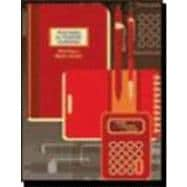
| Reflective Teaching for Student Learning Knowledge, Skills, and Attitudes You Need to be an Effective Teacher Reflective Teaching | |
| The No Child Left Behind Act | |
| Understanding Student Differences How We Got Here: A Brief History of U.S. Cultural Diversity Diversity in Today's Classrooms | |
| Teaching Culturally Diverse Learners Intercultural Communication Cultural Pluralism Multicultural Education | |
| Teaching Students with Disabilities Learners with Disabilities Educating Students with Disabilities | |
| Responsibilities of Schools Educating Students with Disabilities | |
| Responsibilities of the Classroom Teacher | |
| Teaching Academically Diverse Learners What Is Intelligence? | |
| Learning Styles Addressing Intelligences and Learning Styles Through Differentiated Instruction | |
| Key Principles of Learning Behaviorist Theories Cognitive Theories Social Learning Theory | |
| Combining Behaviorism with Cognition | |
| School Culture Historical Purposes of U.S. Schools Purposes of Today's American Schools School Culture | |
| Establishing the Classroom Environment Learning Activities Physical Arrangement of the Classroom Classroom Rules and Policies Organizational Tasks Clashing Cultures | |
| When Classroom Culture and School Culture Collide | |
| Maintaining the Classroom Environment Student Motivations and Needs | |
| What Do Students Want? | |
| Getting, and Keeping, Students Focused Preventing Misbehavior Dealing with Misbehavior | |
| Planning What to Teach Planning to Plan | |
| Influences on the Planning Process The Planning Process Interdisciplinary Planning | |
| Planning Lessons Lesson Plan Overview Learning Goals and Objectives State Standards in Your Lesson Plan Materials Planning Procedure Assessment Extensions/Differentiations Transitioning Connections Among the Subjects | |
| How to Teach The Purpose of the Lesson Learning Activities Timing and Pacing Adjusting Learning Activities to Learning Styles | |
| Communication in the Classroom Teachers as Communication Senders Instructional Messages Means of Communication Your Students | |
| Receivers of Instructional Communication Feedback | |
| Confirming Delivery of Your Message Negotiating and Conflict Resolution Skills | |
| Teaching and Technology | |
| Technology Terminology, or What Might You Find in Your Classroom? | |
| A New Way to Teach? | |
| A New Way to Learn? | |
| Technology Across the Curriculum | |
| Assessment for Learning | |
| What Is Assessment? | |
| Assessment as Part of Teaching | |
| Purposes for Assessment | |
| Formal and Informal Assessment | |
| Information-Gathering Techniques | |
| Tools for Assessment Measurement | |
| Choosing Assessment Tools Fairness, Reliability, and Validity of Assessment Tools Evaluation | |
| Assigning Value to Information Gathered Grading | |
| Working with Your Students' Families Benefits of Maintaining Good Communication Communication Methods | |
| It's Not Just What I Say, It's How I Say It Getting Parents Involved and Managing Their Involvement | |
| Working with Colleagues The Culture of Teaching Norms of Interaction Among Teachers A New Teaching Culture? | |
| School Governance and Funding Governance of Schools School Funding | |
| Professional Performance Assessment Defining Effective Teaching The Evaluation Process Before the Evaluation | |
| How to Prepare After the Evaluation Self-Assessment | |
| Being a Reflective Practitioner | |
| The Ethics of Teaching The Characteristics of Ethical Teaching Ethical Dilemmas The Everyday Ethics of Teaching | |
| Educational Law Legal Responsibilities of Teachers Legal Rights of Teachers | |
| Hiring, Firing, and Educational Law Hiring Practices Contracts Termination of Service | |
| The First Year Overcoming Initial Disorientation How to Prepare for Your First Year What Help Can You Expect? | |
| Professionalism in Teaching Qualities, Attributes, and Activities of the Complete Professional Societal Views of Teaching and Teachers | |
| The Drive to Upgrade the Teaching Profession Your Own Professional Development Professionalism and Your Philosophy of Teaching | |
| Table of Contents provided by Publisher. All Rights Reserved. |
The New copy of this book will include any supplemental materials advertised. Please check the title of the book to determine if it should include any access cards, study guides, lab manuals, CDs, etc.
The Used, Rental and eBook copies of this book are not guaranteed to include any supplemental materials. Typically, only the book itself is included. This is true even if the title states it includes any access cards, study guides, lab manuals, CDs, etc.